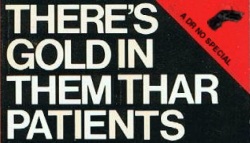 Just as there is gold for drug companies in them thar pills, so there is gold for GPs in them thar patients. Historically, GPs were paid chiefly on a patient head-count basis, topped up with item of service fees for ‘extras’ such as vaccinations and contraception. The simplest way for GPs to boost income under this system was to increase list size, sometimes to absurd levels where the GP could not hope to provide adequate care for all the patients on the list. Some even gamed the system, by sneaking ghost patients on their lists. Governments disliked crude head-count based pay, not least because it offered no scope to influence GP activity. Item of service payments were an attempt to change that, but the capitation fee was still paid whatever the doctor did, or didn’t, do. The below par golfing GP trousered the fee in equal measure to his more conscientious colleague on the other side of town.
Just as there is gold for drug companies in them thar pills, so there is gold for GPs in them thar patients. Historically, GPs were paid chiefly on a patient head-count basis, topped up with item of service fees for ‘extras’ such as vaccinations and contraception. The simplest way for GPs to boost income under this system was to increase list size, sometimes to absurd levels where the GP could not hope to provide adequate care for all the patients on the list. Some even gamed the system, by sneaking ghost patients on their lists. Governments disliked crude head-count based pay, not least because it offered no scope to influence GP activity. Item of service payments were an attempt to change that, but the capitation fee was still paid whatever the doctor did, or didn’t, do. The below par golfing GP trousered the fee in equal measure to his more conscientious colleague on the other side of town.
It is part of NHS folklore that Bevan got doctors to accept the NHS by stuffing their mouths with gold. But, as is often the way with folklore, it isn’t entirely accurate. It wasn’t all doctors who had their cake holes crammed, just hospital doctors, who in return agreed to become salaried NHS employees. GPs instead got something they then valued even more than money: autonomy, the so-called independent contractor status. They could continue their cherished corner-shop chemist arrangements, contracting with the NHS to provide a service. How they provided the service was largely up to them: good GPs provided a good service, while golfing GPs matched their practice to their handicap.
Then, eight years ago, something rather curious happened. General practice was, as it often is, in a mess. The government, as it always is, was fed up with not being able to influence GP activity. Out of this Devil’s Cauldron a toxic brew came forth. The GP negotiators of the day, unable or unwilling to see how short was their spoon, supped the brew, an intoxicating brew of more money for less work. Mouths stuffed with the sweetest gold, they failed to spot the implications of the bitter medicine within. The 2004 contract contained, in addition to capitation and item of service fees, a new element of performance related pay. Hundreds of markers would measure performance, with increasing pay for better performance. The government had out-smarted the GPs: gold, but in return hundreds of levers of control. GPs might imagine themselves still independent contractors, but in reality they had signed up to micro-management. They had supped with too short a spoon, and swallowed gold, only to find the devil really was in the detail. They had, in all but name, lost their cherished independent contractor status.
Over the last few years, the consequences of this forfeiture of independence in return for gold have become plain to see. Where we had independent GPs looking after individual patients, we now have state operatives pushing state sponsored coercive healthism on populations. The master pulls a lever, and the puppet dances. The gold is indeed the detail, but so too is the devil.
But Dr No dares to hope that all is not lost. The recent outbreaks of caring and sharing mania in some GP quarters are, it seems to Dr No, a heartfelt backlash against being turned into state sponsored inquisitors and statinators. And where there is such a backlash, there is hope.
